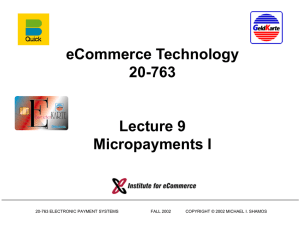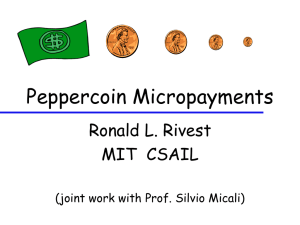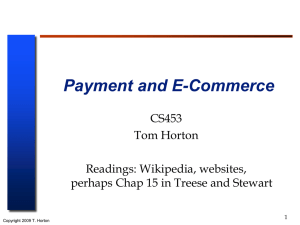Legal person merchant
advertisement
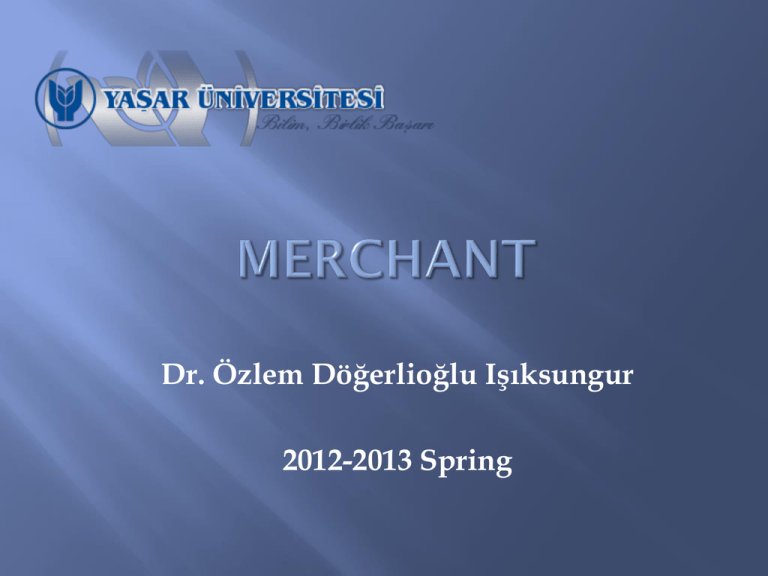
Dr. Özlem Döğerlioğlu Işıksungur 2012-2013 Spring Regulated in Article 11-23 of TCC Merchants: Real (natural) persons Legal person In NTCC, “merchant” concept regulated seperately from the point of “real person” and “legal person” REAL (NATURAL)PERSONS Definition: Person who operates a commercial enterprise, at least in part,under his name. Elements: Existence of a commercial enterprise Operation of the commercial enterprise, at least in part Operation of the commercial enterprise, at least in part, under the name of the person concerned LEGAL PERSONS Commercial companies Associations & Foundations which operate commercial enterprise to achieve their targets Entities which are formed by State, Private Provincial Administration, Municipality, Village and other public corporations to be operated in a commercial manner or pursuant to their statutes of foundation to be managed according to private law Definition: (Article 12.1 TCC) The person who operates a commercial enterprise, at least in part, under his name Operation under the name of the merchant Commercial Enterprise De facto operation = MERCHANT A- Existence of a Commercial Enterprise General rule: To qualify as a merchant, existence of commercial enterprise is the first condition Elements of commercial enterprise? BUT A person who although has not established a commercial enterprise, enters into relationship with third parties as if he had formed a commercial enterprise, shall be held liable like merchant against third parties in good faith A- Existence of a Commercial EnterpriseCONTINUE Elements of commercial enterprise Economic activity Continuity Independency Capacity A- Existence CONTINUE of a Commercial Enterprise- Third party shouldn’t know or it should be not possible to know that there is not a commercial enterprise, an ordinary partnership or any coorporation. The person who enters into relationship with third parties as if he had formed a commercial enterprise (actually not) LIABLE as merchant, BUT Doesn’t benefit from the rights given to merchant Example: demand of bankruptcy is possible but demand for decreasing of penal clause is not possible B- Operation of the commercial enterprise What is the meaning of “ operation of commercial enterprise? De facto operation TCC Article 12/II Establisment of an enterprise Enter into business dealings with third parties “Bir ticari işletmeyi kurup açtığını, sirküler, gazete, radyo, televizyon ve diğer ilan araçlarıyla halka bildirmiş veya işletmesini ticaret siciline tescil ettirerek durumu ilan etmiş olan kimse, fiilen işletmeye başlamamış olsa bile tacir sayılır” The person involved should have started the operations. If he/she has entered the establishment with register of commerce and publication or has made annnouncements to the public, whether through newspapers or by distributing letters or leaflets, adverstising establishment, he would still be regarded as a merchant Rights&obligations of being merchant C- Operation of the commercial enterprise at least in part, under the name of the person concerned “at least in part” – jointly operation of enterprise by more than one person Operation of the enterprise by merchant is not compulsory On behalf of merchant, anyone may operate the commercial enterprise “Merchant character” belongs to whom? Worker? A- Existence of a Commercial EnterpriseCONTINUE The person involved should have started the operations. If he/she has entered the establishment with register of commerce or has made annnouncements to the public, whether through newspapers or by distributing letters or leaflets, adverstising establishment, he would still be regarded as a merchant Minor Not being in full possession of his mental faculties Barred from involving in commercial business Civil servants Dealing in commercial activities depended on a permission People who are minor and who are under guardianship People barred from involving in commercial business Dealing in commercial activities depended on a permission A- People who are minor and who are under guardianship : According to TCC Article 13, if the commercial enterprise is operated by a legal representative (guardian by nature or curator) on behalf of the people who are minor and who are under guardianship, these people shall be deemed as merchant Legal responsibility derived from being merchant belongs to people who are minor and who are under guardianship but criminal liablity belongs to guardian by nature or curator People who are minor and guardianship : who are under guardianship? who are under Insanity (madness) Weakness of the mind Prodigality ( savurganlık), toxicomania (alcohol,narcotic), bad lifestyle, bad management Jail sentence (one and over one year) Demand B-People barred from involving in commercial business Article 14/I of TCC: The person who are deprived of or prohibited from dealing in commercial activities because of Their personal status or The position/profession they occupy Prohibition: Legal provision or Judgment Permission required: (person or legal authority) Deemed as merchant accordingly, if they are engaged in commercial enterprise Kişisel durumları ya da yaptığı işlerin niteliği nedenyle yahut meslek ve görevleri dolayısıyla, kanundan veya bir yargı kararından doğan bir yasağa aykırı bir şekilde ya da başka bir kişinin veya resmi makamın iznine gerek olmasın rağmen izin ve onay almadan bir ticari işletmeyi işleten kişi de tacir sayılır (TTK.m.14/I, B- People barred from involving in commercial business-Cont. Example: Civil servants prohibition related to commerce İf operates commercial enterprise Shall be deemed as merchant At the same time, the person shall be subject to legal, criminal and disiplinary sanctions according to their private law For civil servants disiplinary sanction C- Dealing in commercial activities depended on a permission The position of married women To operate a commercial enterprise, Permission from husband is not required TCC 12.2 TCC 14.1 TCC Article 12.3--- against third parties in good faith TCC Article 13.1 Doesn’t benefit from the rights given to merchant Person deemed as merchant, shall benefit from the rights and be responsible for the obligations that derived from being merchant Person who is responsible as merchant , shall only be responsible as merchant but shall not benefit from the rights given to merchant A. B. C. D. Commercial companies Associations which operate commercial enterprise Foundations which operate commercial enterprise Entities which are formed by State, Private Provincial Administration, Municipality, Village and other public corporations to be operated in a commercial manner or pursuant to their statutes of foundation to be managed according to private law Commercial companies A. Collective company b. Commandit company c. Joint-stock company d. Limited (liability)company e. Co-operatives a. All commercial companies are merchant (shall be accepted as merchant from the date of registration) B-Associations that operate commercial enterprise Founding purpose: Spiritual Example: An association established for helping poor people– opens a luxury restaurant to generate financial resource– Association shall be deemed as merchant- The commercial enterprise shall be registered to register of commerce Beneficial Societies (Kamu yararına dernek) are not merchantKızılay operating Afyonkarahisar minarel water Beneficial Societies: operation more than 1 year, purpose of the Association, activities concerning the realistaion of the purpose, Decision of the Council of Ministers is necessary C-Foundations that operate commercial enterprise General Rule: The FouBeneficial Societies (Foundations) (Kamu Yarararlı Vakıflar) are not merchant. (Foundations that spent %50 or more of its income to the affairs that has public duty).



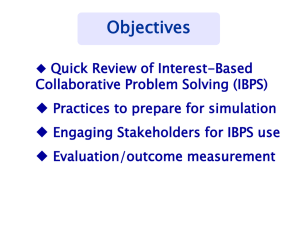
![platinum_presentation[1]](http://s2.studylib.net/store/data/005222927_1-20b6c53250f6dd80de50e457d09553b6-300x300.png)



